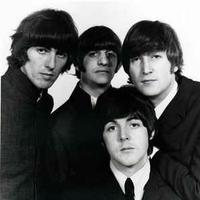Early Days
Frühe Tage
Early Days
Primeros días
Les premiers jours
I primi giorni
初期
초기 시절
Ankstyvosios dienos
Primeiros dias
Первые дни
İlk Günler
Перші дні
早些年
早年
The four boys from Liverpool were all born during the Second World War.
||||Liverpool||||||||
||||||||dəvamında|||Dünya|
||||リバプール||||||||
||||Ліверпуль||||||||
リバプールの4人の男の子はすべて第二次世界大戦中に生まれました。
Life in the northern city wasn't always easy after the war.
|||северном|||||||война
|||şimalı|||||||
|||kuzeydeki|||||||
|||північному|||||||
|||northern|||||||
戦後、北部の都市での生活は必ずしも容易ではありませんでした。
Most people lived in small houses and many were poor.
|||in||||||
ほとんどの人々は小さな家に住み、多くは貧しかった。
But like many ports, Liverpool was open to new ideas.
|||портов||||||
|||ports||||||
|||limanlar||||||
|||порти||||||ідеям
|||limanlar||||||
|||港|リバプール|||||
De mint sok kikötő, Liverpool is nyitott volt az új ötletekre.
但像許多港口一樣,利物浦對新想法持開放態度。
Sometimes ships brought something that other places in Britain couldn't get - rock and roll records from the US!
|корабли||||||||||||||||
||delivered to|||||||||||||||
|||||||||||||roll|plaklar|||
時々||||他の||||イギリス|手に入れられなかった||||ロックンロール||||
||привозили|||||||||||||||
時々、船はイギリスの他の場所では手に入らないもの、つまりアメリカからのロックンロールのレコードを運んでくることがあった!
有時船會帶來一些英國其他地方無法獲得的東西——美國的搖滾唱片!
For the young people of Liverpool in the 1950s, the exciting sound of rock and roll was an escape from their daily lives.
||||||||||увлекательный||||||||бегство||||жизни
||||||||||ამაღელვებელი||||||||||||
|For young Liverpudlians|||||||||||||||||||||
|||||||||||âm thanh|||||||lối thoát||||
||||||||||heyecan verici||||||||||||
||||||||||||||||||втеча||||
Richard Starkey (Ringo Starr) was born in 1940 and grew up in one of Liverpool's poorest areas.
|||Старр|||||вырос|||||Ливерпуля|беднейших|районов
|Richard Starkey|nickname|nickname|||||was raised|||||city's||
||||||||||||||nghèo nhất|
Річард|Старкі|Рінго|Старр||||||||||Ліверпуля|бідніших|районах
||||||||||||||ən kasıb|rayonlarından
リチャード|スターキー|リンゴ|||||||||||リバプールの|最も貧しい|
理查德·斯塔基 (Ringo Starr) 出生於 1940 年,在利物浦最貧困的地區之一長大。
He was often ill, and he first played drums in hospital.
|||болен|||||||
||||||||the drums||
||||||||trống||
||sık sık||||||davul çaldı||
||||||||барабани||
||||||||tutulma||
|||病気|||||||
他經常生病,他第一次在醫院打鼓。
He bought his first drum around 1956 - just one big drum!
|купил|||барабан|||||
he||||musical instrument|||||
|||||||||tutum
他在 1956 年左右買了他的第一個鼓——只有一個大鼓!
He played with a few local bands.
|||||yerli|qrupda
||||||групами
Then he joined Rory Storm and the Hurricanes.
||присоединился|Рори||||Ураганы
|||Rory Storm||||band name
||||Fırtına|||Kasırgalar
|||||||ハリケーンズ
|||Рорі||||Урагани
その後、ローリー・ストームとハリケーンズに加わった。
然後他加入了羅里風暴和颶風。
Around this time, Richard took a new name - 'Ringo' - because of all the rings on his hands.
Khoảng thời gian||||||||||||||||
||||||||||||||||əllərində
|||||||||||||yüzükler|||
|||||||||のため||||指輪|||
|||||||||||||персні|||
大約在這個時候,理查德取了一個新名字——“林戈”——因為他手上的所有戒指。
George Harrison, the youngest Beatle, was born in 1943.
|||младший|Битл|||
Corc|||||||
||||member of Beatles|||
||||ビートルズ|||
|Гаррісон|||Бітл|||
George Harrison, a legfiatalabb Beatle 1943-ban született.
His father was a bus driver, but before that he worked on ships.
|||||водитель|||||||
|父|||||しかし||||||
父親はバスの運転手だったが、それ以前は船で働いていた。
George loved his father's records from the US.
|любил|||пластинки|||
At school, he sat in class drawing pictures of guitars.
||||||рисуя|||гитары
|||was seated||||||
|||oturdu||||||
||彼|||||||
|||||||||гітари
在學校,他坐在課堂上畫吉他。
When he did get his guitar, he practiced all the time.
|||получил|свою||||||
|||||гітара|||||
當他拿到吉他時,他一直在練習。
Paul McCartney was born in 1942, the son of a nurse and a cotton salesman.
|||||||||медсестра||||продавец
|Paul McCartney|||||||||||cotton|merchant
||||||||||||người bán bông|người bán bông
Пол|Маккартні|||||||||||продавець бавовни|продавець бавовни
|||||o||||tibb bacısı|||pamuk|satıcısı
|マッカートニー||||||||||||綿のセールスマン
Paul McCartney 1942-ben született egy ápolónő és egy gyapotkereskedő fiaként.
ポール・マッカートニーは1942年、看護婦と綿花のセールスマンの息子として生まれた。
保羅麥卡特尼出生於 1942 年,是一名護士和一名棉花推銷員的兒子。
The family loved music.
семья|||
When Paul was old enough, his father bought him a trumpet.
|||||||купил|||труба
||||||||||ტრომპეტი
||||||||||trumpet
||||||||||kèn trumpet
||||||||||труба
|||年を取った|||||||トランペット
ポールが年頃になると、父親がトランペットを買ってくれた。
But Paul couldn't play the trumpet and sing at the same time.
|||||trumpet||mağaza||||
しかし、パウロはトランペットを吹きながら同時に歌うことはできなかった。
So he changed the trumpet for a guitar.
||||musical instrument|||
|||||||гітару
He sometimes talked about music with a younger boy at his school - George Harrison.
John Lennon was born in 1940.
|John Lennon|||
Джон|Леннон|||
After his father left, his mother sent the four-year-old boy to his Aunt Mimi and her husband's big house in a pleasant part of Liverpool.
|||||||||four years old||||||Aunt Mimi||||||||nice|||
|||||||||||||||||||||||vùng dễ chịu|||
|||||||||||||||||||||||hoş bir|||
|||пішов|||відправила|||||||||тітка Мімі|||чоловіка тітки||||||||
||||||göndərdi|||||||||||||böyük||||gözəl|||
||||||||||||||||||夫の||||||||
父親が去った後、母親は4歳の少年をリバプールの快適な場所にあるミミおばさんとその夫の大きな家に預けた。
Після того, як батько пішов, мати відправила чотирирічного хлопчика до тітки Мімі та її чоловіка у великий будинок у приємній частині Ліверпуля.
父親離開後,母親把這個四歲的男孩送到了他的咪咪姨媽和她丈夫在利物浦宜人地區的大房子裡。
John loved rock and roll.
||||roll
He remembered seeing an Elvis Presley film.
||||Elvis Presley|Elvis Presley|
彼は||||エルビス|エルビス・プレスリー|
||||Елвіс|Елвіс Преслі|
他記得看過一部貓王的電影。
When the audience screamed, he thought, 'That's a good job!'
||khán giả|hét lên||||||
||auditoriya|qışqırdı||||||
||izleyici|||düşündü||||
||група людей|закричала||||||
|||cheered loudly||said||||
観客から悲鳴が上がったとき、彼は『よくやった!』と思った。
當觀眾尖叫時,他想,“這是一個好工作!”
John's mother loved music too - and she taught her son well.
|||||||instructed|||
|||||||dạy|||
|||||||öğretti||oğlunu|
Джона|||||||вчила|||
|||||||öyrətdi|||
||||||彼女は||||
ジョンの母親も音楽が大好きで、息子によく教えていた。
He started a band, the Quarry Men.
|||||Quarry|
|||||Quarry|
|||||クオリー|
|||групу||Кар'єрні люди|Чоловіки
Egy zenekart alapított, a Quarry Men-t.
他創辦了一個樂隊,採石人。
The name came from his school, Quarry Bank.
||||||Quarry Bank|
|||||||Банк
Назва походить від його школи, Quarry Bank.
這個名字來自他的學校,Quarry Bank。
One afternoon in July 1957, a friend took Paul to see the Quarry Men at a church garden party.
|||tháng Bảy||||||||||tại||||
|one afternoon|||||brought|||||||||||
|||||||||||||||kilsə||
||||ある|||||||||||教会||
|||||||||||||||церква||
1957 júliusának egyik délutánján egy barátja elvitte Pault, hogy megnézze a Quarry Men-t egy templomi kerti partin.
Одного дня в липні 1957 року друг взяв Пола на вечірку в церковному саду, щоб побачити "Каменярів".
1957 年 7 月的一個下午,一位朋友帶保羅去教堂花園聚會上看採石人。
John was singing, but he couldn't remember all the words.
|||||qoymadı||||
約翰在唱歌,但他記不起所有的歌詞。
This didn't stop him - he sang new words.
|||||yeni kelimeler söyledi||
After the concert, Paul played a song on his guitar for John.
音樂會結束後,保羅用他的吉他為約翰演奏了一首歌曲。
Years later, John remembered the meeting.
|sonra||||
数年後、ジョンはその会議を思い出しました。
多年後,約翰想起了這次會面。
Paul was better than the people in the band, but John was a little worried.
|||||||||но|||||
|was|||||||||||||
||daha yaxşı|daha||||bu|||||||
ポールはバンドのメンバーより上手だったが、ジョンは少し心配だった。
保羅比樂隊裡的人好,但約翰有點擔心。
What was more important: his own strong position in the group, or a stronger group?
|||||||vị thế|||||||
|||||öz||mövqeyi|||||||
何|||重要な|||||||||||
グループ内での彼自身の強力な地位と、より強力なグループのどちらがより重要でしたか?
更重要的是:自己在團隊中的強勢地位,還是更強大的團隊?
He chose the group.
Lennon and McCartney were together.

